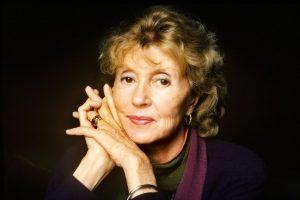Adam Gopnik at The New Yorker:
 Every death erases a uniqueness. But to say that there was no one on earth like Francine du Plessix Gray is to state a simple and obvious truth. There were three cultural—call them national—streams in her existence: French by birth and background, she was American in upbringing and in principles, and yet also deeply Russian in personal mythology and values and warmth. (Her Russian mother, Tatiana Yakovleva, was the great love of the poet Mayakovsky’s life, and Francine, by a rumor that both exasperated and entertained her, was acclaimed on her visits to Russia as his illegitimate daughter.) Francine, who died on Sunday, at the age of eighty-eight, was raised in what used to be called high or café society—Tatiana, whom she once profiled warmly but warily in this magazine, became, after a hair-raising escape from France during the war, a leading hat maker and style setter at Saks Fifth Avenue; her stepfather, Alexander Liberman, was for many decades the editorial director of all Condé Nast magazines. Francine was thin, tall, beautiful, stylish, and naturally elegant. (Someone who adored her recalls her welcoming visitors to a showing of paintings by her husband, Cleve Gray, dressed all in white, a cashmere sweater perfectly thrown around her shoulders.) She could easily have settled for a life as a model—astonishingly photogenic, she was photographed many times by Irving Penn—or simply as a society beauty, a New York “philanthropist.” But she chose, with an energy and a purpose not made less admirable by the taut stylishness with which she accomplished it, to become what she admired: a novelist, a working reporter, a biographer, a leading feminist, a woman of letters, an honest and unsparing and tender memoirist. She became Francine du Plessix Gray.
Every death erases a uniqueness. But to say that there was no one on earth like Francine du Plessix Gray is to state a simple and obvious truth. There were three cultural—call them national—streams in her existence: French by birth and background, she was American in upbringing and in principles, and yet also deeply Russian in personal mythology and values and warmth. (Her Russian mother, Tatiana Yakovleva, was the great love of the poet Mayakovsky’s life, and Francine, by a rumor that both exasperated and entertained her, was acclaimed on her visits to Russia as his illegitimate daughter.) Francine, who died on Sunday, at the age of eighty-eight, was raised in what used to be called high or café society—Tatiana, whom she once profiled warmly but warily in this magazine, became, after a hair-raising escape from France during the war, a leading hat maker and style setter at Saks Fifth Avenue; her stepfather, Alexander Liberman, was for many decades the editorial director of all Condé Nast magazines. Francine was thin, tall, beautiful, stylish, and naturally elegant. (Someone who adored her recalls her welcoming visitors to a showing of paintings by her husband, Cleve Gray, dressed all in white, a cashmere sweater perfectly thrown around her shoulders.) She could easily have settled for a life as a model—astonishingly photogenic, she was photographed many times by Irving Penn—or simply as a society beauty, a New York “philanthropist.” But she chose, with an energy and a purpose not made less admirable by the taut stylishness with which she accomplished it, to become what she admired: a novelist, a working reporter, a biographer, a leading feminist, a woman of letters, an honest and unsparing and tender memoirist. She became Francine du Plessix Gray.
more here.
